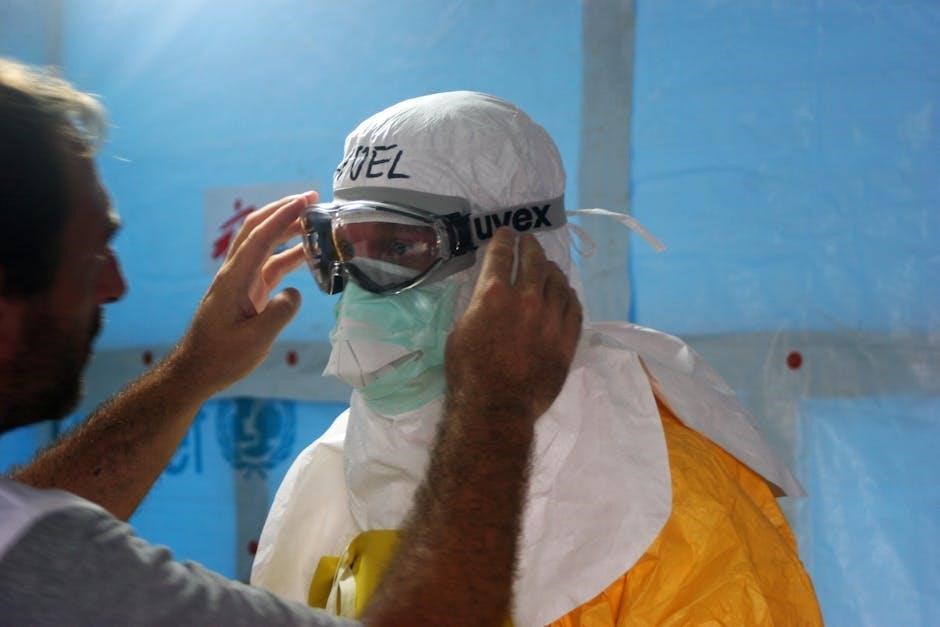A facility manager ensures the smooth operation of buildings and resources, managing maintenance, repairs, and safety․ They oversee custodial and security services, budgeting, and team leadership, optimizing organizational success․
Overview of Facility Management
Facility management is a multidisciplinary field focused on maintaining and improving the functionality, safety, and efficiency of buildings and related infrastructure․ It encompasses a wide range of activities, from managing physical spaces to ensuring compliance with safety and environmental standards․ Facility managers oversee the day-to-day operations of facilities, ensuring they align with organizational goals and user needs․ This role involves coordinating maintenance, repairs, and upgrades while balancing cost-effectiveness and sustainability․ Effective facility management enhances user experience, supports operational efficiency, and contributes to the overall success of an organization․ It requires strong communication, technical knowledge, and strategic planning to address both immediate needs and long-term objectives․
Importance of Facility Managers in Organizations
Facility managers play a crucial role in ensuring the efficient operation of an organization’s physical environment․ They are responsible for maintaining safe, functional, and cost-effective facilities, which directly impact productivity, employee satisfaction, and business continuity․ By overseeing maintenance, repairs, and resource allocation, facility managers help organizations optimize their assets and reduce operational costs․ Their role in ensuring compliance with safety and regulatory standards is vital for mitigating risks and avoiding legal issues․ Additionally, facility managers contribute to creating a positive work environment, which can enhance employee morale and retention․ Their strategic oversight ensures that facilities align with organizational goals, making them indispensable to the overall success of the business․

Key Responsibilities of a Facility Manager
Facility managers are responsible for maintaining facilities, overseeing custodial services, managing budgets, supervising staff, ensuring safety, and handling emergencies to ensure efficient organizational operations and asset preservation․

General Facilities Management

A facility manager oversees the daily operations of buildings and grounds, ensuring they meet high standards of safety, cleanliness, and functionality․ They manage maintenance, repairs, and upgrades, coordinating with staff and contractors to address issues promptly․ The role involves conducting regular inspections to identify and resolve potential problems, ensuring compliance with safety regulations․ Facility managers also seek feedback from users to improve service delivery and optimize space utilization․ They are responsible for coordinating with various departments to align facilities with organizational goals․ Additionally, they manage resources efficiently, ensuring cost-effective operations while maintaining a welcoming environment for occupants․ Their oversight ensures seamless day-to-day operations, supporting the organization’s mission and success․
A key responsibility of a facility manager is overseeing the maintenance and repair of buildings and equipment․ This involves scheduling regular inspections to identify and address potential issues before they escalate․ They coordinate with maintenance crews and contractors to ensure timely repairs, minimizing disruptions to daily operations․ Facility managers also manage preventive maintenance programs to extend the lifecycle of equipment and buildings․ They are responsible for estimating materials and labor costs for repairs and ensuring compliance with safety standards․ By proactively managing maintenance activities, facility managers help maintain a safe, efficient, and functional environment for occupants․ Their efforts ensure that all systems operate smoothly, supporting the organization’s productivity and success․ Effective maintenance management is crucial for sustaining operational excellence and asset longevity․ A facility manager is responsible for overseeing custodial and security services to ensure a clean, safe, and secure environment․ This includes supervising custodial staff, coordinating cleaning schedules, and maintaining high standards of hygiene․ They also manage security personnel, monitor access controls, and implement safety protocols to protect people and assets․ Facility managers ensure compliance with safety regulations and address any security breaches promptly․ They work closely with teams to maintain order and respond to emergencies, ensuring a welcoming and secure space for occupants․ Effective oversight of custodial and security services is essential for maintaining operational efficiency and fostering a positive environment․ Leadership and clear communication are key to ensuring these services align with organizational goals and standards․ This role requires attention to detail and strong organizational skills to manage diverse responsibilities effectively․ Facility managers handle day-to-day operations, ensuring safety, compliance, and efficient resource management․ They oversee budgets, supervise staff, and maintain high operational standards to support organizational goals․ A critical role of facility managers is ensuring all safety protocols and regulatory standards are met․ This involves conducting regular inspections, preparing emergency plans, and training staff on safety procedures․ Compliance with local, state, and federal regulations is mandatory to avoid legal issues and ensure a safe environment․ They also manage risk assessments, implement safety measures, and maintain records of compliance activities․ By prioritizing safety, facility managers protect both people and assets, ensuring a secure and healthy workplace․ Their efforts are essential for maintaining operational continuity and organizational reputation․ Facility managers are responsible for overseeing budgets and financial planning to ensure cost-effective operations․ This includes allocating resources, monitoring expenses, and optimizing budget utilization․ They prepare financial reports, analyze expenditure trends, and identify cost-saving opportunities․ Facility managers also manage vendor contracts and negotiate agreements to secure favorable terms․ Financial planning involves forecasting future needs, ensuring funds are available for maintenance, repairs, and upgrades․ They work closely with finance teams to align facilities management goals with organizational financial objectives․ Effective budget management ensures that facilities operate efficiently while supporting the organization’s strategic priorities․ Strong financial acumen is essential for facility managers to balance operational needs with fiscal responsibility․ Facility managers lead and supervise staff, fostering a productive and efficient work environment․ They provide guidance, set performance goals, and ensure tasks align with organizational objectives․ Effective communication and conflict resolution are key, as they motivate teams to maintain high standards․ Managers also conduct performance evaluations and support professional development, enhancing team capabilities․ Additionally, they promote a culture of respect and safety, ensuring compliance with workplace policies․ Strong leadership ensures seamless operations, tenant satisfaction, and alignment with strategic goals․ By empowering staff, facility managers drive success and adapt to organizational needs, fostering collaboration and accountability within their teams․ Facility managers play a crucial role in strategic planning, coordinating with departments, and optimizing operational processes to align facilities with organizational goals and objectives effectively․ Facility managers are responsible for planning and optimizing physical spaces to meet organizational needs․ They assess current and future space requirements, ensuring efficient use of buildings and resources․ This involves analyzing occupancy trends, forecasting space demands, and recommending layout adjustments․ Effective space management enhances productivity, supports operational efficiency, and aligns with strategic goals․ Managers also oversee moves, renovations, and reconfigurations, ensuring minimal disruption to daily activities․ By leveraging data and stakeholder input, they create adaptable environments that foster collaboration and innovation, ultimately contributing to the organization’s long-term success and sustainability․ Facility managers act as central coordinators, ensuring alignment between organizational goals and facility operations․ They collaborate with various departments to understand their needs and preferences, facilitating effective communication․ By maintaining strong relationships with stakeholders, including employees, clients, and vendors, they ensure seamless delivery of services․ This role involves mediating between different groups, resolving conflicts, and prioritizing requests to maximize efficiency․ Effective coordination enhances overall satisfaction and operational harmony, making the facility manager a pivotal figure in maintaining organizational cohesion and achieving strategic objectives․ Facility managers play a crucial role in promoting environmental sustainability by implementing eco-friendly practices․ They oversee energy-efficient systems, waste reduction programs, and water conservation measures to minimize the facility’s carbon footprint․ By adopting green technologies and renewable energy sources, they contribute to long-term cost savings and regulatory compliance․ Additionally, facility managers collaborate with stakeholders to develop and monitor sustainability goals, ensuring alignment with organizational values․ Their efforts include conducting audits, training staff on sustainable practices, and reporting progress to leadership․ Effective implementation of sustainability initiatives not only enhances the organization’s reputation but also supports global environmental objectives, making the facility manager a key driver of corporate responsibility and environmental stewardship; Facility managers develop emergency plans, conduct safety drills, and manage crises to ensure safety and minimize disruptions․ They prepare for natural disasters, fires, and other potential threats․ Facility managers create comprehensive emergency plans to address crises like natural disasters, fires, and system failures․ These plans include evacuation procedures, communication protocols, and emergency contact lists․ They ensure compliance with safety regulations and tailor strategies to the facility’s unique needs․ Regular updates and stakeholder collaboration are essential for effectiveness․ The goal is to minimize risks, protect occupants, and maintain operational continuity during emergencies․ Facility managers conduct routine safety inspections to identify potential hazards and ensure compliance with safety standards․ These inspections cover fire extinguishers, emergency exits, electrical systems, and other critical areas․ Managers document findings, prioritize repairs, and implement corrective actions․ They also train staff on safety protocols and maintain records for regulatory compliance․ Regular inspections help prevent accidents, protect occupants, and maintain a safe working environment․ Facility managers play a critical role in managing crisis situations, ensuring the safety of occupants and the integrity of facilities․ They lead emergency response efforts, coordinate with security and emergency services, and communicate effectively during crises․ Facility managers assess damage, prioritize recovery efforts, and restore operations swiftly․ They also conduct post-crisis reviews to improve future responses․ Effective crisis management involves maintaining emergency plans, training staff, and ensuring compliance with safety protocols․ Facility managers must remain calm under pressure, make quick decisions, and prioritize the well-being of people and property․ Their ability to manage crises ensures minimal disruption and fosters resilience within the organization․Maintenance and Repair of Buildings and Equipment

Overseeing Custodial and Security Services


Operational Duties
Ensuring Safety and Compliance Standards
Managing Budgets and Financial Planning
Supervising Staff and Team Leadership

Strategic Roles

Facility Planning and Space Management
Coordinating with Departments and Stakeholders

Implementing Sustainability Initiatives
Emergency Preparedness and Response
Developing Emergency Plans
Conducting Regular Safety Inspections
Managing Crisis Situations
